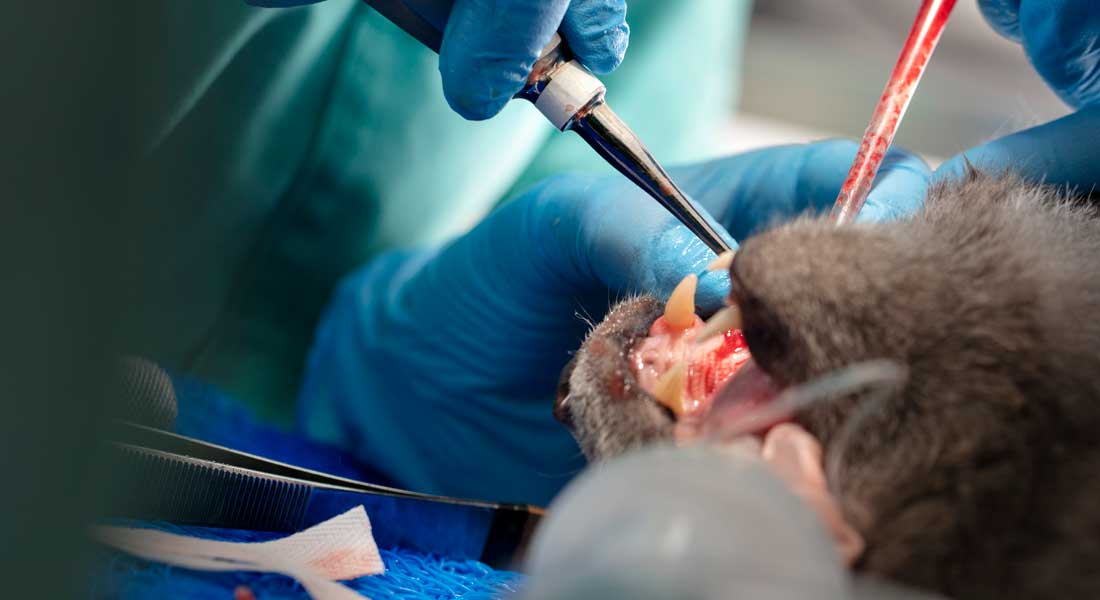Advanced Clinical Companion Animal Odontology
This course is a specialisation course at the Master of Companion Animal Clinical Science. The Master is a post graduate education targeted small animal veterinarians seeking Continuing Professional Development (CPD).

The purpose of this course is to extend the student’s knowledge, skills and competences within the approach to, assessment and management of advanced clinical companion animal odontology.
The course will extend the students assessment and management of companion animal oral and dental patients.
Read more about the Master of Companion Animal Clinical Science.
Lectures, e-learning, theoretical and practical exercises. Case-study work.
Knowledge
The graduate will be able to:
- Understand the etiology, pathophysiology and clinical appearance of disorders of the oral cavity including the teeth and the jaw bone.
- Define, identify and discuss veterinary methodology and para clinical tools in systematized reflective clinical decision making in advanced companion animal clinical odontology.
- Explain, reflect about and demonstrate overview of complex clinical decision making, patient therapy and prognosis at an advanced level in odontology
- List, classify, and demonstrate critical reflection on existing and new approaches to patient diagnosis, therapy, management and client education in a specialty practice situation within advanced companion animal odontology.
- Define and identify relevant anatomical structures.
Skills
Within the area of clinical companion animal odontology the graduate will be able to:
- Interpret, assess and reflect on collected patient data in order to localize and identify diseases of the oral cavity and its causes, make clinical decisions, arrive at a diagnosis, apply, and integrate evidence based scientific approaches to plan and administer further diagnostics like imaging, histopathology and cytology.
- Perform endodontic treatment of traumatized teeth including vital pulp therapy and root canal treatment including use of new technologies.
- Perform orthodontic treatment in patients with traumatizing malocclusion.
- Perform various types of invasive oral surgery in patients with oral cancer.
- Assess patients after surgery with focus on treatment effect, complications and prognosis.
- Continuously seek out, reflect on and apply new evidence based methods management in specialized companion animal odontology patients.
- Communicate and discuss academic issues and solution models with both peers and non-specialists at an advanced level and across disciplines within companion animal odontology practice.
- Communicate effectively in writing and pass on results to relevant parties.
Competences
The graduate will be able to:
- Evaluate and manage companion animal diseases within companion animal odontology, which may necessitate novel solutions and approaches identified from current medical literature or other resources.
- Work independently, take responsibility for, predict, prognosticate and make decisions within the chosen specialisation.
- Collaborate constructively within and between specialists/professionals and lay persons involved in companion animal patient management.
- Make ethical considerations regarding diagnostic methods and therapies and place these into perspective.
- Oral neoplasia and other patient types where ethical issues are pertinent to discuss both medically and in relation to the individual patient and client.
- Independently evaluate and structure own learning processes and continuously obtain new knowledge at a specialty level within companion animal odontology.
- Evidence based presentation of topics and cases
- Evidence based research/study protocol/systematic review for diagnosis, management or therapy of disease incl. inclusion and exclusion criteria
You must meet the following criteria to be admitted to this course:
- Hold a degree in Veterinary Medicine
- Hold one of the following certifications
- DVA Certificate in Small Animal Diseases (equivalent to the 4 compulsory courses of the Master of Companion Animal Clinical Science)
- Swedish / Norwegian / Finnish specialist in diseases of dogs and cats
- Equivalent competences
- Have a minimum of 2 years of relevant work experience from companion animal practice
- Be proficient in English
Find detailed information about the formal requirements for this course.
The course responsibles at the specialisation track in Companion Animal Odontology are:
- Professor Annemarie Thuri Kristensen, Department of Veterinary Clinical Sciences, The Faculty of Health and Medical Sciences, University of Copenhagen, Denmark.
- National specialist and Diplomat Hanne Ellen Kortegaard, Department of Veterinary Clinical Sciences, The Faculty of Health and Medical Sciences, University of Copenhagen, Denmark.
Lecturers: National and international capacities within the field.
Course details
| Duration: | 5 days on campus |
| Dates: | Offered next time spring 2026 |
| Frequency: | Only available every second year |
| Course capacity: | 10 students |
| Place: | University Hospital for Companion Animals, Frederiksberg, Denmark |
| Course fee: | EU/EEA citizens Single course participant: 36,500 DKK Master student: 33,000 DKK Non-EU/EEA citizens Single course participant: 40,740 DKK Master student: 37,240 DKK Tuition fees include course materials and lunch/coffee. Books are not included in the tuition fees and must be purchased by the participants. |
| Level and credit: | Master course; 6 ECTS |
| Examination date: | Please consult the exam schedule |
| Application deadline: | Master's programme: 1 May 2025 Course: February 2026 |
| Admission: | To be admitted, you must meet the admission criteria for specializations at Master of Companion Animal Clinical Science |
The opening of the application period is announced via the programme newsletter.
Download course curriculum
